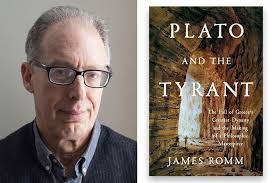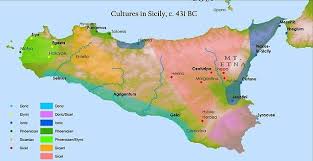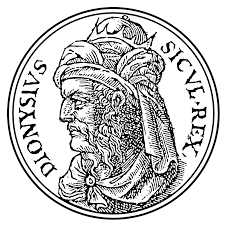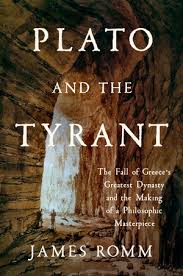Good Reads meta-data is 368 pages rated 4.28 by 72 litizens.
Genre: Biography.
DNA: Academic.
Verdict: The anti-platonic Plato.
Tagline: He kept all of receipts.

Focus is in the title, that is, Plato’s on-again, off-again relationship with the tyrant father and son, Dionysius the Elder and the Younger of Syracuse on Sicily. Before going on please note, that in Greek the word ‘tyrant’ meant a ruler who was not hereditary. Because Herodotus’ account of the Persian Wars looked east (as did Alexander the Great later in retaliation), and much of Thucydides’ account of the Peloponnesian War concentrated on the Greek peninsula and the east, with the exception of the catastrophe at this very same Syracuse in earlier times when it was a democracy. In contrast, the extensive Greek settlements in the western Mediterranean are not as well documented and known. But Greek colonies populated southern Italy, Sicily, Marseilles in France, as far as Cadiz in Spain.
The greatest single power among the Western Greeks was Syracuse. It had wealth from silver and gold, and large population compared to many other cities. Its double harbour gave it an advantage in sea trade. And it had, by the time the Dionysius two ruled, a formidable military reputation after having defeated that Athenian invasion in the Peloponnesian War.

Plato went to Syracuse – a long and expensive voyage with some risks from weather and pirates – three times over two decades. He did so, when the smoke and mirrors of scholarship have been exhausted, to encourage the ruler(s) of Syracuse to exercise moderation. He hoped to convert a ruler to think of the whole in the long term against the highest and most abstract standard. The Dionysii were infamous for their cruelty, debauchery, hedonism, and worse, but Plato decided he could but try, despite the apparent odds. The Elder was cruel and rapacious but liked to have trophy wives, slaves, and intellectuals in his entourage. The Younger was vain, selfish, and debauched by food, drink, and sex. Not promising ground then, but Plato had a student of old at court, one Dion who was wealthy and an in-law of the Dionysii to pave the way for him. So Plato tried and tried again, and again. To no avail.
These efforts have long fascinated Platonists and much has been written about them over the centuries. The author’s mastery of this multi-lingual literature is impressive. Very. Intriguing also to learn Twenty-First century efforts to apply MRI technology to reading carbonised scrolls destroyed/preserved by the eruption of Mount Vesuvius.

Instead of admiring Plato for dirtying his hands, even risking his life, and trying to redeem the tyrants (and thereby lighten their yoke on the people of Syracuse), he is indicted for interfering by hindsight moralists. But he did little more than advise moderation. Does make him liable for what followed. It seems so since he is routinely arraigned as an accessory.
I first read of this story in Mary Renaut’s novelThe Mask of Apollo (1954) when I was an graduate student. It was recommended to me by someone whose identity has by now escaped me. Perhaps I will re-read that. We will see.
Awhile ago I read and commented on a book the front cover of which declared it to be a biography of Plato. It was a very well done account of the history of his time and place, but not a biography of the man. Ergo, I was still in the market for a biography and when Howard Whitton sent me a review of this book, I had a look, and it promised some more biography. This is another excellent study that tries to bring out the biographical echoes in Plato’s essays, particularly Republic.
A few months ago I read and commented on a Straussian study of Plato’s thirteen letters (Ariel Helfer, Plato’s Letters [2023]) that…. That entry is elsewhere on this blog for clickers. Well, Straussians make a lot out of little or nothing. If aboriginal stargazers concentrated on the black areas of the sky rather than the stars, Straussians concentrate on what it absent; silence; what is not said. Of course, there is a lot of nothing, right Jean-Paul? And you can make it mean whatever you want want.
Long ago I read Ludwig Marcuse, Plato and Dionysius: a Double Biography (1947) and learned nothing about either of them from it.

